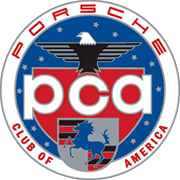 Boxster Owners 1997-2005 Face Potentially Catastrophic Failure of Intermediate Shaft Bearing
Boxster Owners 1997-2005 Face Potentially Catastrophic Failure of Intermediate Shaft Bearing
By Charlie Booher
GMT Chief Driving Instructor
Director at Large
There are a lot of good articles on the internet concerning the Intermediate Shaft Bearing (IMS) used in 1997 through 2005 Boxster’s and 1999 through 2005 911’s and there is also a lot of hype and anger. Obviously, the authors weren’t around when early 911 cam chain tensioners were failing, mid 70’s 911’s valve guides were wearing out at 40000 miles, 911SC and 3.2 Carrera head studs were failing, and early 3.6 engines had head sealing issues. These things happen, yet we still love the car. The fact is though, that the IMS Bearing in the M96 and M97 engines do fail and there is little warning when they do. Apparently, some fail at 20,000 miles and many have gone past 200,000 miles.

Note: The 1997 thru 1999 Boxsters all used the double row bearing. Starting at some point in the 2000 model year, they went to the single row bearing and continued this thru the 2005 model year. The double row bearing has much better reliability.
For this article, I am going to call upon my engineering background and 20+ years working in chemical and pharmaceutical plants. The bearing that Porsche uses in the IMS is a common industrial 6204 ball bearing. This bearing is often used in electric motors, pumps and other rotating equipment with good 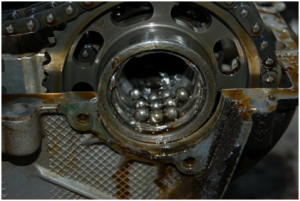 results. The most common bearing failure mode in industrial equipment results from the equipment sitting for a long period. At one plant, we would have spare electric motors and pumps on the shelf for critical applications. We found that these spares failed from bearing failure within days of installation. Why, you ask? We found that when the piece of equipment was stationary in storage, the balls in the bearing would press out the grease lubricant where the balls contacted the race and would leave a small rust spot. When the piece of equipment was put into service, the bearing would grind itself apart. We discovered this when we proactively installed new bearings on a spare immediately prior to installing online and then inspected the removed bearings. The rust signature was apparent. We then had a technician rotate shafts on spare equipmen
results. The most common bearing failure mode in industrial equipment results from the equipment sitting for a long period. At one plant, we would have spare electric motors and pumps on the shelf for critical applications. We found that these spares failed from bearing failure within days of installation. Why, you ask? We found that when the piece of equipment was stationary in storage, the balls in the bearing would press out the grease lubricant where the balls contacted the race and would leave a small rust spot. When the piece of equipment was put into service, the bearing would grind itself apart. We discovered this when we proactively installed new bearings on a spare immediately prior to installing online and then inspected the removed bearings. The rust signature was apparent. We then had a technician rotate shafts on spare equipmen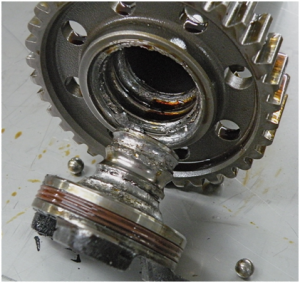 t to prevent this on a monthly basis with good results.
t to prevent this on a monthly basis with good results.
So what can we do to prevent IMS failure in our beloved cars”? I will use the advice that the folks at LN Engineering have stated. Change the oil more frequently than Porsche recommends — say every 3000 to 5000 miles or at least annually, and closely inspect the oil and filter for metal particulate. Use a heavier viscosity oil such as a 15W 40 synthetic. Drive the car often and try to keep the revs above 2500 RPM while cruising. Change the IMS bearing proactively when the clutch needs replacement on higher mileage cars. On cars that have very low mileage that sit for long periods, I would consider changing the bearing sooner rather than later.
I changed the clutch, clutch release arm, slave cylinder, rear main seal, and IMS bearing over the winter on my 1999 Boxster. This is a car that I bought in 2012, and that was the original owner’s daily driver that had 115,000 miles on it when the clutch failed shortly after I purchased it. The car was sitting for a period before I fixed it. I did the job in my home garage, since I had sold my business in December. My home garage is somewhat better equipped than most though, and I have a scissors lift that will pick the car 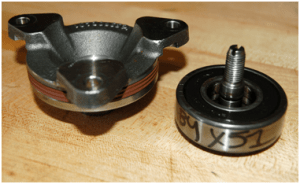 up about 4 feet. The entire job is pretty well documented on the Pelican Parts site complete with pictures. Once you get the transmission out and the clutch off as well as the flywheel because you are going to change the rear main seal once you have it this far apart, replacing the IMS bearing takes, I found, about two additional hours and frankly, was very straightforward. I checked the old bearing and it was fine and I found no signs of debris in the engine.
up about 4 feet. The entire job is pretty well documented on the Pelican Parts site complete with pictures. Once you get the transmission out and the clutch off as well as the flywheel because you are going to change the rear main seal once you have it this far apart, replacing the IMS bearing takes, I found, about two additional hours and frankly, was very straightforward. I checked the old bearing and it was fine and I found no signs of debris in the engine.
I had a discussion with a club member regarding replacement bearings. You have choices and you have choices based on the year of 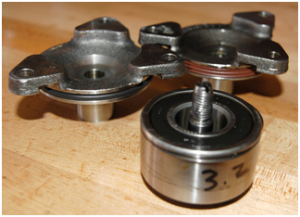 your car. You can use the factory bearing. Or, LN Engineering has a replacement double row ceramic bearing for the 1997 thru 1999 cars, a replacement ceramic single row or upgraded ceramic double row bearing for the 2000 thru 2005 cars, and a pressure- fed plain bearing for 1997 thru 2005 cars that eliminates the problem altogether but at a rather higher cost. Vertex Auto also sells an upgraded pressure fed roller bearing. As I said, you have choices.
your car. You can use the factory bearing. Or, LN Engineering has a replacement double row ceramic bearing for the 1997 thru 1999 cars, a replacement ceramic single row or upgraded ceramic double row bearing for the 2000 thru 2005 cars, and a pressure- fed plain bearing for 1997 thru 2005 cars that eliminates the problem altogether but at a rather higher cost. Vertex Auto also sells an upgraded pressure fed roller bearing. As I said, you have choices.
It ends up being a fairly expensive job for both parts and labor but done proactively, it is certainly cheaper than replacing the engine. If your mechanic recommends that it be done, he is actually trying to save you money in the long run. Happy motoring!,





